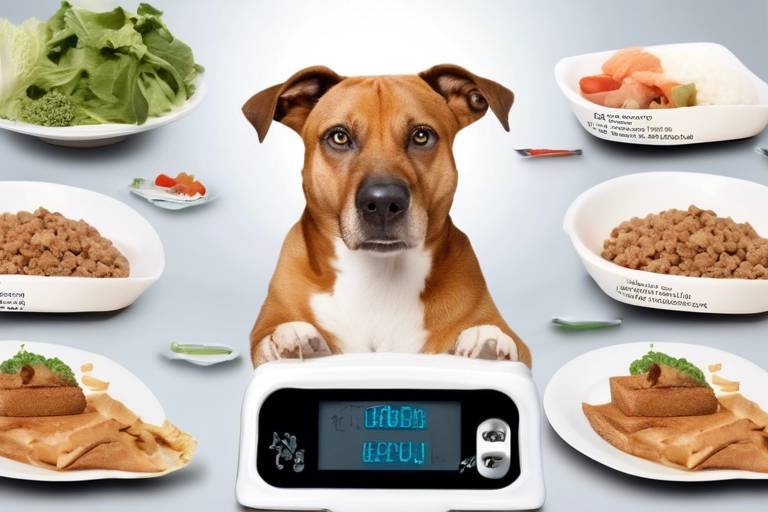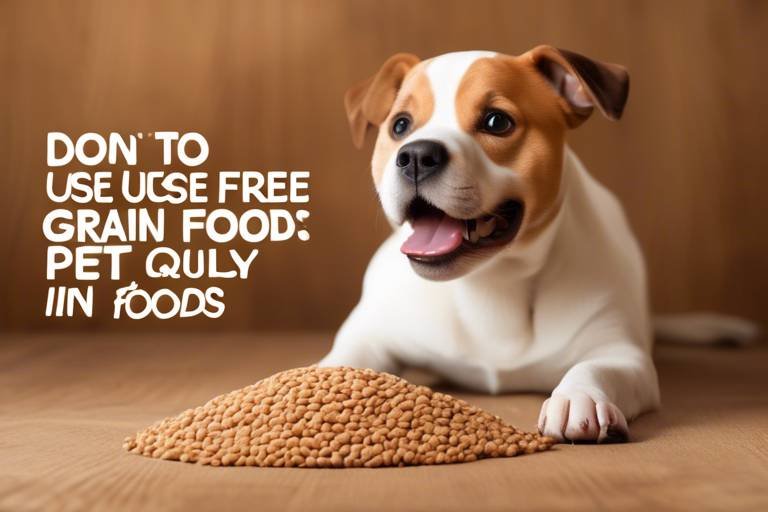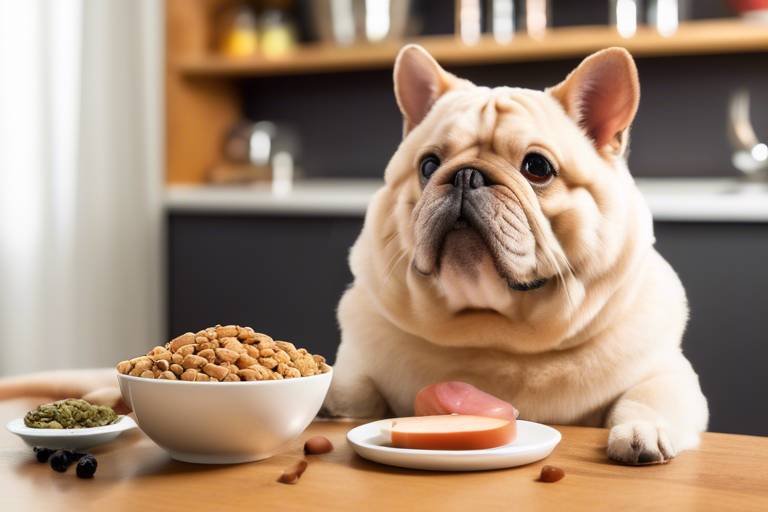The Benefits of Feeding Pets Fresh Food
In a world where convenience often trumps quality, the diet of our beloved pets frequently falls victim to processed foods filled with additives and preservatives. But have you ever paused to consider the transformative power of fresh food? Just like us, pets thrive on a diet rich in natural ingredients. Incorporating fresh food into your pet's meals can lead to a myriad of benefits that not only enhance their health but also improve their overall quality of life. Imagine your furry friend bounding around with energy, their coat gleaming in the sunlight, and their digestive system functioning like a well-oiled machine. This is not just a dream; it can be a reality when you choose to feed them fresh food.
So, what are the specific advantages of switching to a fresh food diet? Let’s dive into the details and uncover how this simple change can lead to a happier, healthier pet. From improved digestive health to increased energy levels, the benefits are numerous and compelling. You might be surprised to learn that many pet owners have noticed significant changes in their pets' behavior and health after making this switch. Are you ready to explore how fresh food can revolutionize your pet's diet and overall well-being? Let’s get started!
One of the first and most significant benefits of feeding your pet fresh food is the remarkable enhancement in their digestive health. Fresh foods, packed with nutrients, promote better nutrient absorption and can significantly reduce gastrointestinal issues. Pets, much like humans, can struggle with digestion when consuming overly processed diets. By introducing a balanced diet of fresh ingredients, you can support optimal digestion for your furry friends. For instance, fresh fruits and vegetables contain essential fibers that help regulate their digestive systems, leading to less bloating and discomfort.
Have you noticed your pet lounging around more than usual? It might be time to rethink their diet. Feeding pets fresh food can lead to significantly higher energy levels and improved vitality. Natural ingredients serve as a fuel source that keeps pets active and playful. Think of it like this: just as a high-octane fuel powers a race car, fresh food energizes your pet. Ingredients such as lean meats, whole grains, and fresh vegetables provide the essential nutrients your pet needs to thrive. You’ll likely find your pet more eager to play fetch or go for long walks, showing off their newfound energy and enthusiasm.
Maintaining a healthy weight is crucial for your pet’s overall well-being. A diet rich in fresh foods can assist in achieving this goal. By controlling portion sizes and selecting low-calorie fresh options, you can prevent obesity-related health issues. Fresh foods are often more filling and nutrient-dense compared to processed alternatives, which means your pet can feel satisfied without overindulging. Consider this: just as we choose salads over greasy fast food to stay fit, our pets can benefit from similar choices.
When comparing fresh food to processed alternatives, the nutritional benefits of whole ingredients become strikingly clear. Processed pet food often contains fillers, artificial colors, and preservatives that can contribute to health problems. In contrast, fresh food is free from these harmful additives and is packed with vitamins and minerals essential for your pet's health. A simple table below illustrates the differences:
| Aspect | Fresh Food | Processed Food |
|---|---|---|
| Nutritional Value | High | Variable |
| Preservatives | None | Often included |
| Digestibility | High | Lower |
| Allergen Potential | Low | Higher |
Preparing homemade meals for your pets allows you to have complete control over their diet. This not only ensures that they are receiving the best possible nutrition but also allows you to tailor meals to their specific needs. When crafting these meals, consider incorporating a variety of proteins, vegetables, and grains to create balanced, nutritious options. You might be surprised at how easy it is to whip up a delicious meal that your pet will love. Plus, the joy of watching them devour a meal made with love is a reward in itself!
Many pets suffer from food allergies that can be alleviated through fresh food diets. By identifying allergens and incorporating fresh ingredients, you can significantly improve your pet's skin and coat health. If your pet has been scratching or has a dull coat, switching to fresh food might just be the solution you need. The right combination of fresh proteins, vegetables, and healthy fats can work wonders in alleviating those pesky allergy symptoms.
A diet rich in fresh food can lead to a shinier, healthier coat for your pets. Essential fatty acids and vitamins found in fresh ingredients play a crucial role in promoting optimal fur health. Imagine running your fingers through your pet's coat and feeling the silkiness and shine that comes from a nutritious diet. It's not just about aesthetics; a healthy coat is often a reflection of a healthy pet.
Feeding pets a fresh food diet may contribute to a longer, healthier life. The connection between nutrition and longevity is profound. Just as we are what we eat, our pets are too. Fresh ingredients support their overall health as they age, potentially leading to fewer vet visits and a better quality of life in their golden years. Think of it as investing in your pet’s future health; the dividends will pay off in the form of a happy, active companion for years to come.
- Can I feed my pet only fresh food? Yes, but it's important to ensure that their diet is balanced and meets all nutritional requirements.
- How do I transition my pet to a fresh food diet? Gradually introduce fresh food by mixing it with their current food over a week or two.
- Are there any specific fresh foods that are bad for pets? Some foods, like onions and chocolate, are toxic to pets and should be avoided.
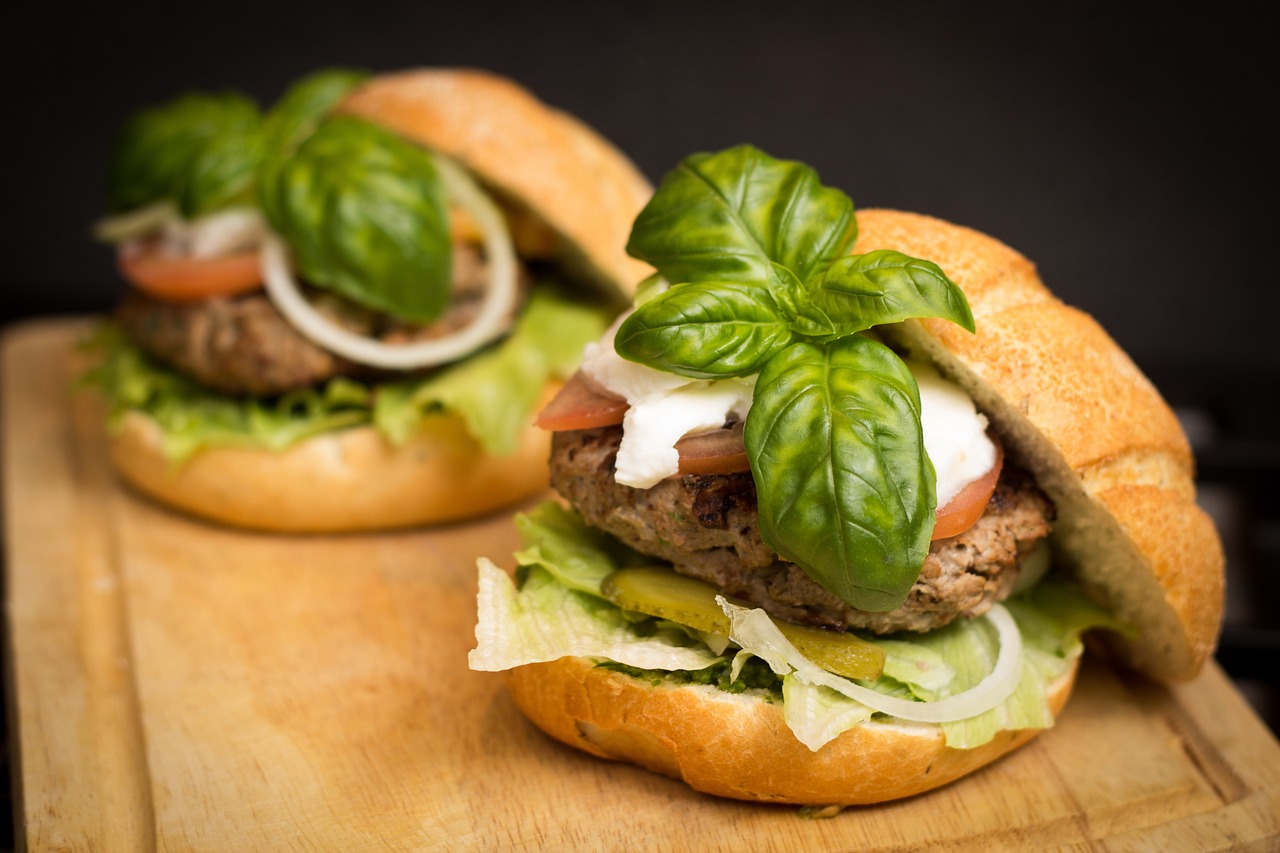
Improved Digestive Health
When it comes to our furry friends, their digestive health is crucial for overall well-being. Just like us, pets can experience a range of gastrointestinal issues, from bloating to irregular bowel movements. One of the most effective ways to promote a healthy digestive system is by incorporating fresh food into their diets. Unlike processed foods, which often contain fillers and artificial additives, fresh ingredients are packed with nutrients that support optimal digestion.
Fresh food provides a natural source of dietary fiber, which is essential for maintaining a healthy gut. Fiber aids in regulating bowel movements and can help prevent constipation. For pets that are prone to digestive issues, a diet rich in fresh fruits and vegetables can make all the difference. For example, ingredients like pumpkin and sweet potatoes are not only delicious but also loaded with fiber that helps keep everything moving smoothly through their digestive tract.
In addition to fiber, fresh food is often easier for pets to digest, reducing the likelihood of gastrointestinal distress. When pets consume whole, unprocessed ingredients, their bodies can break down the nutrients more efficiently. This means better absorption of vitamins and minerals, leading to improved health. A diet filled with fresh proteins, like chicken or fish, along with a variety of vegetables, can provide the essential amino acids and nutrients that support a healthy gut flora.
It's important to consider the balance of nutrients in your pet's diet. A well-rounded meal could include:
- Lean proteins: Chicken, turkey, and fish
- Vegetables: Carrots, peas, and spinach
- Whole grains: Brown rice or quinoa
- Healthy fats: Fish oil or flaxseed oil
By feeding your pets a diet rich in these fresh ingredients, you not only enhance their digestive health but also boost their immune system. A healthy gut contributes to overall wellness, making your pets less susceptible to illnesses. Moreover, a balanced diet can help alleviate symptoms associated with food allergies or sensitivities, which can often lead to digestive discomfort.
In conclusion, making the switch to fresh food is a game changer for your pet's digestive health. Not only does it promote better nutrient absorption and regular bowel movements, but it also sets the stage for a healthier, happier life. If you're looking to improve your pet's digestion, consider gradually incorporating fresh ingredients into their meals. Your furry friend will thank you with wagging tails and happy purrs!
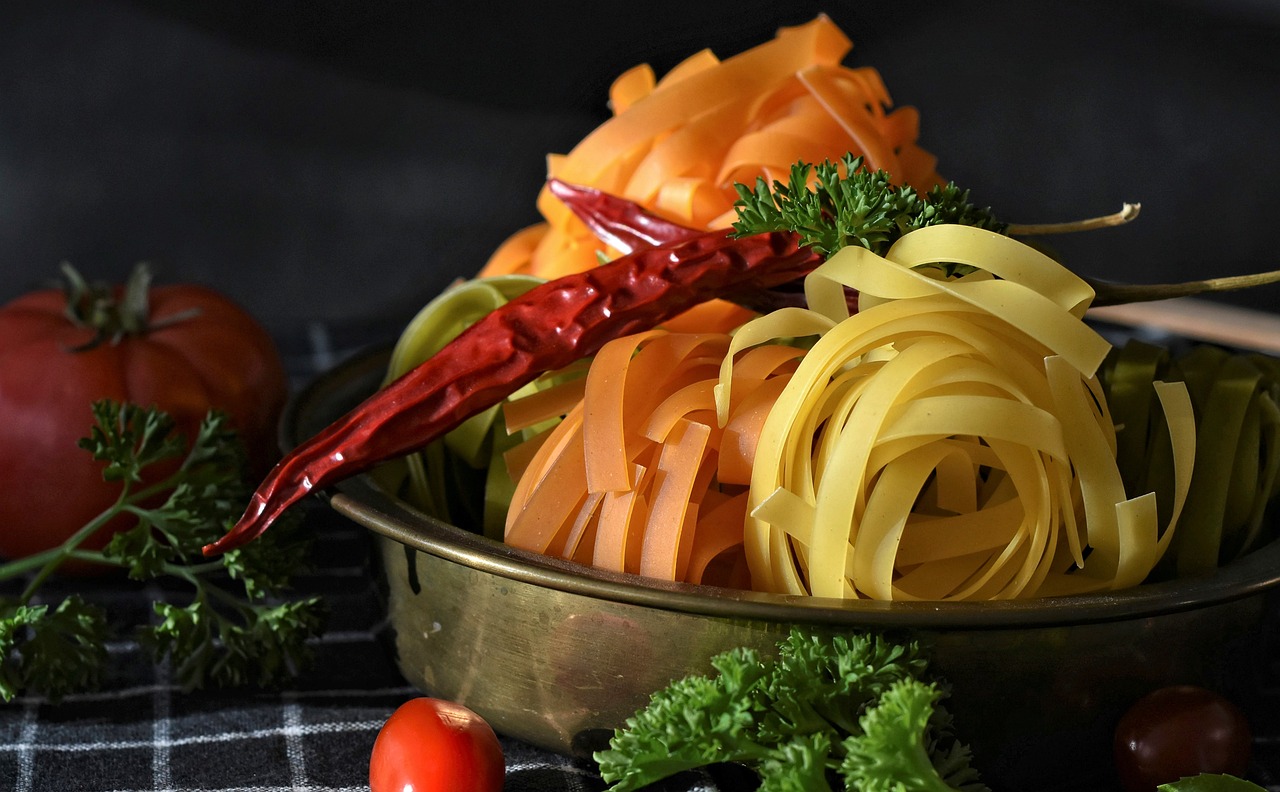
Increased Energy Levels
Have you ever noticed how your pet seems to bounce off the walls after a good meal? It's not just a coincidence! Feeding your furry friends fresh food can lead to a significant boost in their energy levels, making them more active and playful. Unlike processed pet foods that often contain fillers and artificial ingredients, fresh food is packed with the nutrients your pets need to thrive. Imagine fueling your car with premium gasoline instead of cheap, watered-down fuel; the difference in performance is astounding, right? The same principle applies to our pets.
Fresh ingredients provide a rich source of vitamins, minerals, and proteins that are essential for your pet's overall vitality. When you incorporate whole foods into their diet, you’re not just filling their bowls; you’re fueling their bodies. This means they have the energy to run, play, and explore, which is vital for their physical and mental health. For instance, proteins from fresh meats, healthy fats from fish or flaxseed, and carbohydrates from vegetables work together to create a well-rounded diet that keeps your pet energized throughout the day.
Moreover, the digestibility of fresh food plays a crucial role in energy levels. Pets that consume fresh, whole foods experience better nutrient absorption, which means they can convert what they eat into energy more efficiently. In contrast, processed foods often contain ingredients that are harder to digest, leading to lethargy and weight gain. Imagine trying to run a marathon after eating a heavy, greasy meal—it's no wonder pets fed on processed diets often seem sluggish!
Here’s a quick comparison to illustrate the differences:
| Aspect | Fresh Food | Processed Food |
|---|---|---|
| Nutrient Density | High | Low |
| Digestibility | Easy | Difficult |
| Energy Levels | Increased | Decreased |
Incorporating fresh foods into your pet's diet can also help to regulate their blood sugar levels, providing a steady stream of energy throughout the day. This is particularly important for pets that may suffer from conditions like diabetes. By avoiding the spikes and crashes associated with processed foods, your pet can enjoy a more balanced and energetic life. Imagine how much more fun you could have with a pet that is always ready to play!
In conclusion, feeding your pets fresh food is a game changer when it comes to their energy levels. Not only does it provide the essential nutrients they need, but it also enhances their overall well-being, making them happier and more active companions. So, if you want to see your pet thrive, consider making the switch to fresh food today!
- What types of fresh food can I feed my pet? Fresh meats, vegetables, fruits, and whole grains are great options. Always consult your vet for specific recommendations based on your pet's needs.
- How can I transition my pet to a fresh food diet? Gradually mix fresh food with their current diet over a week or two to help them adjust.
- Will fresh food help my pet lose weight? Yes, fresh food can aid in weight management when combined with appropriate portion control.
Weight Management
When it comes to our furry friends, maintaining a healthy weight is crucial for their overall well-being. Obesity in pets is a growing concern, leading to a myriad of health issues such as diabetes, joint problems, and heart disease. By incorporating fresh food into your pet's diet, you can take a significant step towards effective . Fresh foods are generally lower in calories and higher in nutrients compared to processed options, making them an excellent choice for pets needing to shed a few pounds or maintain a healthy weight.
One of the key advantages of feeding your pet fresh food is the ability to control portions while ensuring they receive the right balance of nutrients. Portion control is essential; even healthy food can contribute to weight gain if overfed. It’s like filling your car with premium fuel—too much can lead to problems. By measuring out portions and providing a variety of fresh ingredients, you can help your pet feel satisfied without the excess calories.
Moreover, fresh foods often contain fewer fillers and artificial ingredients, which can lead to weight gain. When you choose whole, natural ingredients, you’re not just feeding your pet; you’re fueling their body with the right stuff. Think of it as giving them a high-quality engine oil instead of cheap, diluted alternatives. Fresh food helps maintain muscle mass while promoting fat loss, which is essential for a healthy metabolism.
To illustrate the impact of fresh food on weight management, consider the following table that compares the caloric content of typical processed pet food versus fresh food options:
| Food Type | Calories per Cup | Protein Content | Fat Content |
|---|---|---|---|
| Processed Pet Food | 350-450 | 20-25% | 10-15% |
| Fresh Chicken & Vegetables | 200-250 | 25-30% | 5-10% |
| Fresh Fish & Rice | 180-230 | 20-25% | 5-8% |
As you can see, fresh food options not only offer lower calorie counts but also higher protein content, which is vital for maintaining muscle mass while losing weight. When pets consume a diet rich in protein and low in unnecessary calories, they tend to feel fuller for longer, reducing the chances of begging for snacks between meals.
In addition to portion control and nutrient quality, it’s also essential to incorporate regular exercise into your pet's routine. Fresh food can provide the energy they need to stay active and playful. Just like us, pets thrive when they are engaged in physical activities. Combine a balanced diet with daily walks or playtime, and you'll be on the right track to keeping your pet at a healthy weight.
So, if you're looking to help your pet manage their weight effectively, consider transitioning to fresh food. It can be a game changer, leading to a happier, healthier life for your furry companion. Remember, a little change in their diet can lead to a massive impact on their overall health and longevity.
- How do I transition my pet to a fresh food diet? Start by gradually mixing fresh food with their current diet over a week to avoid digestive upset.
- Can all pets eat fresh food? Most pets can benefit from fresh food, but it's best to consult with your veterinarian, especially for pets with specific health issues.
- What types of fresh food are best for pets? Lean meats, vegetables, and whole grains are excellent choices. Always ensure they are safe for your specific pet.
- How can I ensure my pet is getting a balanced diet? Consult with a vet or a pet nutritionist to create a balanced meal plan tailored to your pet's needs.
Fresh Food vs. Processed Food
When it comes to our beloved pets, the debate between fresh food and processed food is one that every pet owner should consider carefully. Imagine feeding your furry friend a meal that is as vibrant and wholesome as the ingredients you would choose for yourself. Fresh food is loaded with nutrients, while processed food often contains fillers and artificial additives that can do more harm than good. But what exactly sets these two options apart?
Processed pet foods are typically made from ingredients that have been heavily altered, often losing their natural goodness in the process. They may contain preservatives, artificial flavors, and colors that make them look appealing but don't contribute to your pet's health. In fact, many of these ingredients can lead to long-term health issues like obesity, diabetes, and even allergies. On the other hand, fresh food is made from whole, natural ingredients that are packed with vitamins, minerals, and proteins essential for your pet's health.
Here’s a quick comparison to illustrate the differences:
| Aspect | Fresh Food | Processed Food |
|---|---|---|
| Nutritional Value | High, with natural vitamins and minerals | Often low, with added synthetic nutrients |
| Ingredient Quality | Whole, recognizable ingredients | Often contains fillers and by-products |
| Digestibility | Highly digestible and bioavailable | Can be hard to digest due to additives |
| Health Benefits | Supports overall health and vitality | May lead to health issues over time |
Choosing fresh food for your pet not only offers them a delicious meal but also ensures they are getting the best nutrition possible. Think of it like this: would you rather eat a home-cooked meal made from fresh ingredients or a pre-packaged meal filled with preservatives? The same logic applies to our pets. They deserve the best, just like we do!
Moreover, many pet owners find that switching to fresh food can alleviate issues like allergies and digestive problems, which are often exacerbated by the low-quality ingredients found in processed foods. By feeding your pet fresh food, you're not just making a meal choice; you're investing in their long-term health and happiness.
In conclusion, while processed pet food may be convenient, the benefits of fresh food far outweigh the ease of grabbing a bag off the shelf. Your pet’s health is worth the effort, and with fresh food, you can ensure they thrive, not just survive. So why not make the switch today and see the transformation in your furry companion?
- Is fresh food more expensive than processed food? While fresh food can be pricier upfront, the long-term health benefits can save you money on vet bills.
- Can I mix fresh food with processed food? Yes, but it's best to consult with a vet to ensure a balanced diet.
- How do I know what fresh food is safe for my pet? Always research or consult with a veterinarian about safe ingredients for your specific pet.
Homemade Fresh Meals
When it comes to our furry companions, there’s nothing quite like the joy of preparing that are tailored to their specific needs. Just imagine the delight on your pet's face as they dig into a meal crafted with love and fresh ingredients! Not only does this approach enhance their dining experience, but it also allows you to have complete control over what goes into their food. You can ensure that every bite is packed with nutrients and free from harmful additives often found in processed pet foods.
Creating homemade meals for your pets can be a fun and rewarding experience. You can experiment with various ingredients to see what your pet loves the most. For instance, lean meats, fresh vegetables, and wholesome grains can be combined to create delicious and nutritious dishes. Here are some key ingredients you might consider incorporating into your homemade pet meals:
- Proteins: Chicken, turkey, beef, or fish are excellent sources of protein that help build strong muscles.
- Vegetables: Carrots, peas, and spinach provide essential vitamins and minerals.
- Grains: Brown rice or quinoa can serve as a healthy carbohydrate source.
- Fats: A bit of olive oil or fish oil can enhance coat health and provide energy.
When preparing these meals, it's crucial to focus on balance. Just like us, pets need a mix of different food groups to thrive. A good rule of thumb is to aim for a diet that consists of about 40% protein, 50% vegetables, and 10% grains. This balance can help ensure that your pet receives all the necessary nutrients to stay healthy and energetic.
Additionally, remember to consult with your veterinarian before making significant changes to your pet's diet. They can provide valuable insights and recommend appropriate portion sizes based on your pet's age, weight, and health status. As you embark on this culinary journey for your furry friend, keep in mind that it’s not just about feeding them; it’s about nourishing them with love and care.
To make your meal prep even easier, consider batch cooking. You can prepare larger quantities of food and store them in the fridge or freezer. This way, you’ll always have fresh meals ready to go, saving you time and ensuring your pet never misses out on the benefits of a fresh diet. Just remember to label your containers with dates to keep track of freshness!
In conclusion, homemade fresh meals are not only beneficial for your pet's health but also a wonderful way to bond with them. The effort you put into preparing these meals will surely be rewarded with wagging tails and happy purrs. So, roll up your sleeves, get creative in the kitchen, and watch as your pet transforms into a healthier, more vibrant version of themselves!
Here are some common questions pet owners have about homemade fresh meals:
- Can I use leftovers for my pet's meals? Yes, as long as the leftovers are safe for pets and do not contain any harmful ingredients like onions or garlic.
- How do I know if I’m providing a balanced diet? Consulting with a veterinarian or a pet nutritionist can help you create a balanced meal plan tailored to your pet's needs.
- Are there any foods I should avoid? Yes, some human foods are toxic to pets, such as chocolate, grapes, and avocados. Always research before introducing new foods.
Allergy Management
Many pet owners are unaware that their furry companions can suffer from food allergies, which can lead to a variety of uncomfortable symptoms, including itching, digestive upset, and even ear infections. The good news is that incorporating fresh food into your pet's diet can significantly alleviate these issues. By opting for whole, natural ingredients, you can better control what goes into your pet's meals and help identify potential allergens.
When transitioning to a fresh food diet, it’s essential to take a systematic approach. Start by introducing one new ingredient at a time. This method allows you to monitor your pet for any signs of allergic reactions, such as vomiting, diarrhea, or skin irritations. If a reaction occurs, you can easily pinpoint the culprit and eliminate it from their diet. Keep a food diary to track what your pet eats and any symptoms they exhibit, which can be incredibly helpful for your veterinarian.
Common allergens in pet food often include:
- Beef
- Dairy products
- Chicken
- Wheat
- Eggs
Once you identify a potential allergen, you can create a tailored meal plan that focuses on fresh, wholesome ingredients your pet can tolerate. For instance, if your pet is allergic to chicken, you might consider alternatives like turkey or fish, which are often less likely to provoke a reaction. Additionally, incorporating a variety of vegetables and grains can help ensure your pet receives a balanced diet while avoiding allergens.
Another important aspect of allergy management is understanding the role of essential nutrients. Fresh food diets are typically rich in omega-3 fatty acids, which can help reduce inflammation and improve skin health. Ingredients such as salmon, flaxseed, and chia seeds are excellent sources of these beneficial fats. Furthermore, vitamins A, E, and D are crucial for maintaining healthy skin and a shiny coat, helping your pet feel their best.
It's also worth noting that some pets may benefit from a limited ingredient diet. This approach simplifies their nutrition by focusing on a few key ingredients, which can reduce the risk of allergic reactions. Consulting with a veterinarian can help you determine the best course of action for your pet's specific needs.
In summary, managing allergies through a fresh food diet not only improves your pet's quality of life but can also enhance their overall health. By carefully selecting ingredients and monitoring their responses, you can create a nutritious and satisfying meal plan that keeps your furry friend happy and healthy.
Q1: What are the signs that my pet might have a food allergy?
A1: Common signs include itching, excessive scratching, ear infections, vomiting, diarrhea, and skin irritations. If you notice any of these symptoms, consult your veterinarian.
Q2: How can I identify which food my pet is allergic to?
A2: The best way to identify allergens is through an elimination diet. Introduce one new ingredient at a time and monitor for any adverse reactions.
Q3: Are there any specific fresh foods that are good for pets with allergies?
A3: Yes! Fish, sweet potatoes, and certain vegetables like carrots and peas are often well-tolerated. Always consult with your vet to ensure a balanced diet.
Q4: Can I prepare homemade meals for my pet with allergies?
A4: Absolutely! Preparing homemade meals allows you to control the ingredients and avoid allergens. Just make sure to consult with a veterinarian to ensure nutritional adequacy.
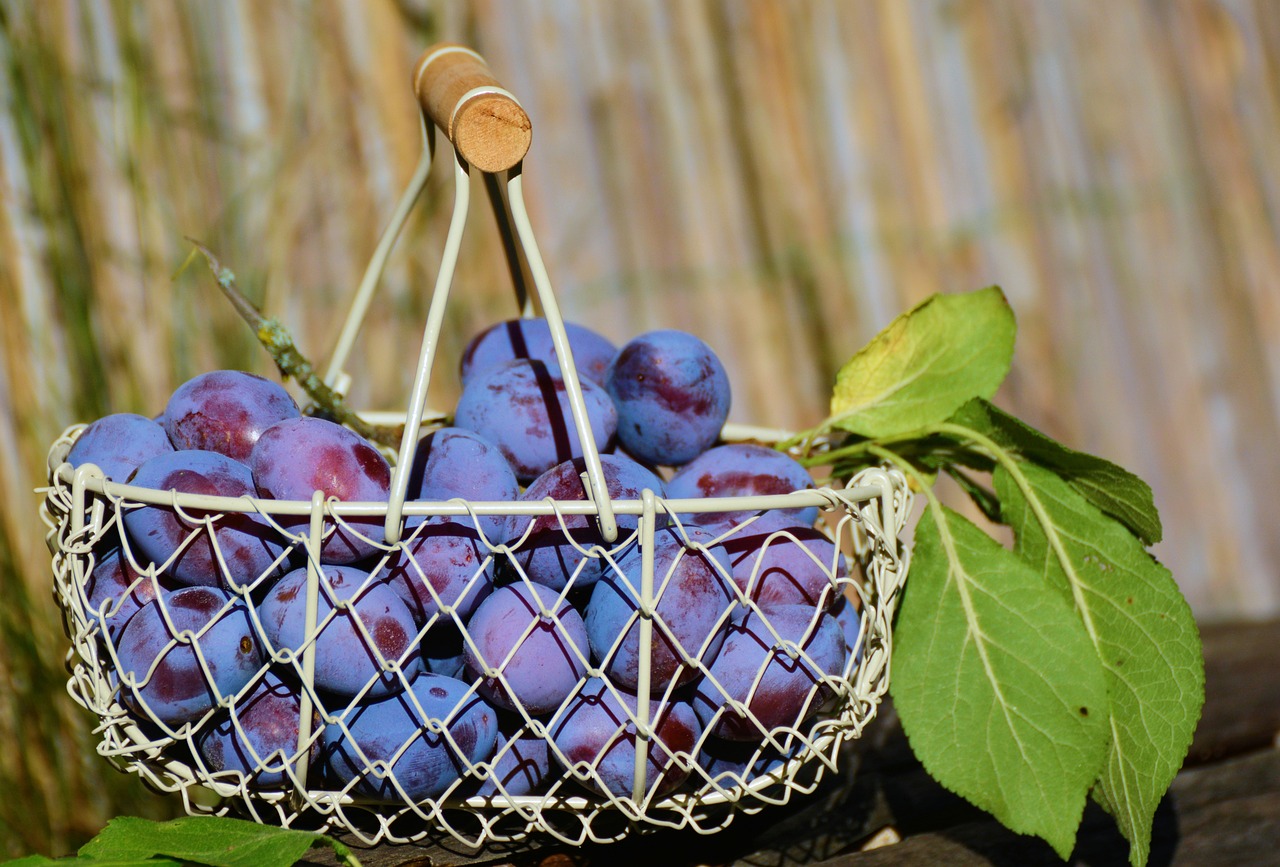
Enhanced Coat Condition
When it comes to our beloved pets, their coat is often the first thing we notice. A shiny, healthy coat is not just about aesthetics; it’s a reflection of your pet’s overall health. Feeding your furry friends a diet rich in fresh food can significantly enhance their coat condition, making it vibrant and full of life. Just like we need a balanced diet to maintain our skin's glow, pets require the right nutrients to keep their fur looking its best.
One of the key components of a healthy coat is the presence of essential fatty acids. These fatty acids, particularly Omega-3 and Omega-6, play a crucial role in maintaining skin moisture and reducing inflammation. Fresh foods such as fish, flaxseed, and certain oils can provide these vital nutrients. When pets are nourished with these ingredients, their skin becomes less prone to dryness and irritation, resulting in a softer and shinier coat.
Moreover, vitamins and minerals are equally important for fur health. For instance, Vitamin E acts as an antioxidant, protecting skin cells from damage and promoting healthy hair growth. Foods rich in antioxidants, like leafy greens and fruits, not only support your pet's immune system but also contribute to a lush coat. When you incorporate a variety of fresh ingredients into your pet's diet, you're essentially providing them with a nutrient powerhouse that caters to their skin and fur needs.
| Nutrient | Benefits for Coat Condition | Sources |
|---|---|---|
| Omega-3 Fatty Acids | Reduces inflammation, promotes moisture | Fish, flaxseed, chia seeds |
| Omega-6 Fatty Acids | Supports skin barrier function | Poultry, eggs, vegetable oils |
| Vitamin E | Protects skin cells, promotes hair growth | Spinach, broccoli, nuts |
| Biotin | Strengthens hair, reduces shedding | Egg yolks, liver, nuts |
In addition to the nutritional benefits, feeding fresh food can also help reduce the occurrence of skin allergies that often lead to coat problems. Many pets suffer from food sensitivities that can manifest as itchy skin or dull fur. By identifying and eliminating allergens from their diet, you can see a remarkable transformation in your pet’s coat condition. Fresh, whole foods allow for better control over what your pet consumes, making it easier to avoid ingredients that trigger reactions.
In conclusion, enhancing your pet's coat condition is just one of the many benefits of feeding them fresh food. It’s not merely about looking good; it’s about ensuring your furry companion feels good from the inside out. By prioritizing fresh ingredients in their diet, you’re investing in their health, happiness, and longevity. So, the next time you’re at the pet store or grocery store, consider reaching for those fresh options. Your pet will thank you with their gorgeous, shiny coat!
- What are the best fresh foods for my pet's coat? Fresh fish, leafy greens, and eggs are excellent choices.
- Can I switch my pet to a fresh food diet gradually? Yes, it's advisable to transition slowly to avoid digestive upset.
- How long will it take to see improvements in my pet's coat? Typically, you may start noticing changes within a few weeks of a fresh food diet.
- Are there any risks associated with feeding pets fresh food? It's essential to ensure that meals are balanced and meet your pet's nutritional needs.
Longer Lifespan
When it comes to our beloved pets, we all want them to live long, happy lives. One of the most impactful ways to enhance your pet's longevity is through a fresh food diet. Just like humans, pets thrive on nutrition that is rich in natural ingredients. By feeding your furry friends fresh food, you're not just filling their bowls; you're fueling their bodies with the essential nutrients they need to combat diseases and maintain optimal health.
Research has shown a strong correlation between diet and lifespan in pets. Fresh food is packed with vitamins, minerals, and antioxidants that can help ward off chronic illnesses. For instance, a diet rich in omega-3 fatty acids can support heart health and reduce inflammation, while antioxidants can help neutralize harmful free radicals in the body. These components are often lacking in processed pet foods, which can lead to a host of health issues over time.
Moreover, fresh food can significantly impact your pet's immune system. A robust immune system is crucial for fighting off infections and diseases. Fresh fruits and vegetables, such as blueberries and carrots, are not only tasty but also help boost immunity. Think of these foods as tiny warriors that protect your pet from harmful invaders!
Another important aspect is the role of hydration. Fresh food often contains higher moisture content compared to dry kibble, which can help keep your pet hydrated. Proper hydration is essential for kidney function and overall health, especially as pets age. In fact, many veterinarians recommend incorporating wet food into your pet's diet for this very reason.
Of course, it’s not just about what you feed your pet, but how you do it. Portion control is vital. Overfeeding, even with healthy food, can lead to obesity, which is a significant risk factor for numerous health problems. By preparing fresh meals at home, you can easily monitor your pet's intake and ensure they maintain a healthy weight.
To summarize, the benefits of a fresh food diet can be profound, leading to a longer lifespan for your pets. Here’s a quick overview of how fresh food contributes to longevity:
| Benefit | Description |
|---|---|
| Improved Nutrition | Fresh food provides essential nutrients that support overall health. |
| Enhanced Immunity | Natural ingredients boost the immune system, helping fight off diseases. |
| Better Hydration | Higher moisture content in fresh food aids in hydration and kidney health. |
| Weight Management | Portion control helps maintain a healthy weight, reducing obesity risks. |
In conclusion, if you want to see your furry friends thrive and enjoy their golden years, consider making the switch to fresh food. Not only will you be investing in their health, but you'll also be providing them with the delicious meals they deserve. After all, a happy pet is a healthy pet!
- What are the best fresh foods for pets? Fresh fruits, vegetables, and high-quality proteins like chicken, fish, and beef are excellent choices. Always consult your veterinarian for specific recommendations.
- Can I mix fresh food with my pet's regular food? Yes, but it's essential to do so gradually to avoid digestive upset. Start by mixing small amounts of fresh food with their regular diet.
- How do I know if my pet has food allergies? Common signs include itching, digestive issues, and skin problems. If you suspect allergies, consult your veterinarian for testing and guidance.
- Is homemade pet food safe? Yes, as long as you ensure it meets your pet's nutritional needs. Research recipes and consult with a vet to create balanced meals.
Frequently Asked Questions
- What are the benefits of feeding my pet fresh food?
Feeding your pet fresh food can lead to improved digestive health, increased energy levels, and a shinier coat. It helps in weight management and can even contribute to a longer lifespan. Fresh ingredients provide essential nutrients that processed foods often lack.
- How does fresh food improve digestive health in pets?
Fresh food is easier for pets to digest compared to processed options. It promotes better nutrient absorption and can reduce gastrointestinal issues. A balanced diet of fresh ingredients helps support optimal digestion, making your furry friend feel more comfortable and healthy.
- Can fresh food help with my pet's allergies?
Absolutely! Many pets suffer from food allergies that can be alleviated by switching to a fresh food diet. By identifying specific allergens and incorporating fresh, whole ingredients, you can improve your pet's skin and coat health significantly.
- Is it difficult to prepare homemade meals for my pet?
Not at all! Preparing homemade meals can be simple and rewarding. You have complete control over what goes into your pet's food, ensuring it's nutritious and tailored to their needs. There are plenty of easy recipes available that can help you get started.
- How do fresh food diets compare to processed pet food?
Fresh food diets generally offer more nutritional benefits than processed pet food. Processed options often contain fillers and artificial ingredients, while fresh food is packed with whole, natural ingredients that support your pet's health and vitality.
- Will feeding my pet fresh food really increase their energy levels?
Yes! Fresh food provides the necessary fuel for your pets to stay active and playful. Natural ingredients are rich in vitamins and minerals that contribute to higher energy levels, making your furry friend more vibrant and lively.
- Can a fresh food diet contribute to my pet's longevity?
Feeding your pet a diet rich in fresh food may indeed contribute to a longer, healthier life. The right nutrition plays a crucial role in overall health, helping to prevent chronic diseases and supporting your pet's well-being as they age.







